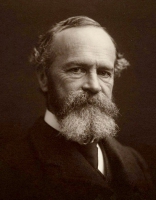| |
生平
威廉·詹姆斯在1842年1月11日出生于美国纽约州纽约,1861年就学于哈佛大学劳伦斯理学院。1864年进入哈佛医学院并与1869年获得医学博士学位。他患有严重的抑郁症和心身性疾病,经常靠阅读《圣经》来维持意志力。为了休息和治疗,曾到欧洲旅行。1878年结婚,健康状况渐趋好转。1875年成为哈佛心理学讲师,讲授解剖学和生理学。1876年到哈佛哲学系任教,1907年离休。
专业
威廉·詹姆斯在法国受到他的教育,他的专业是心理学。当时心理学和哲学之间的分别还不很大。回到美国后他一直在哈佛大学教书。虽然他不相信利用实验可以研究人的心理,他是美国最早的实验心理学家之一。
虽然他认为实践是生活之路,但他不相信通过实践人可以获得客观的真理。虽然每个人都是从生活的实践中获得他对世界的看法的,但詹姆斯认为,每个人从生活的实践中获得的看法是不同的,这是理所当然的。在这一点上他与约翰·杜威的看法不同。
信仰的实践
詹姆斯在宗教哲学上也很有建树。他列举了许多不同的“信仰的实践”(1902年),并使用他的实用主义的看法来体会这些不同的实践。他认为:
- 要研究一个宗教信仰,一个学者要研究这个宗教信仰的核心,而不必研究其组织结构。因为一个宗教的组织结构只反映了其核心的一小部分。
- 强烈的,甚至于病态的实践经验是心理学家的研究题目,而不是哲学家的研究题目。因为心理学家犹如心理的显微镜,他们可以极大地放大我们的日常生活。
- 要想真正地认识普遍存在的、被所有的实践分享的、被历史所证实的真理,一个人要获取一个“超信仰”。这个超信仰是无法被实践证实的,但它可以帮助一个人使他的生活变得更丰富和美好。
他被尊称为美国心理学之父是“美国心灵学研究会”(1885年成立)的主要创立者,终其一生都在探讨超个人的心理现象与超心理学,认为人的精神生活有不能以生物学概念加以解释的地方,可透过某些现象来领会某种“超越性价值”;并强调人有巨大的潜能尚待开发,人的意识只有很少一部分为人所利用。他曾参与类似禅坐的静坐活动,表示静坐是一种唤起深度意志力的方法,可以增加个人的活力与生命力,也做灵媒的实证研究。
此外,威廉横跨哲学、心理学与精神医学界,对超意识的自动书写很感兴趣,曾大量收集案例,并发现青少年最能借此表达内心的纠葛与人格之冲突,他还注意到自动书写有时能解开罪犯的犯罪症结,但并非人人能自动书写,必须透过催眠或其他方法。有趣的是,新时代大师《赛斯书》的作者珍·罗伯兹(Jane Roberts)曾收到过威廉死后的信息,并透过珍的自动书写出版《一位美国作家的死后生存:威廉.詹姆斯的世界观》(The Afterdeath Journal of an American Philosopher,1978)一书,此书除具有深度评论外,并兼论美国历史、心灵学、心理学与民主方面的问题。
著作
- 《心理学原理》1890
- 《信仰意志和通俗哲学请文集》1897
- 《人的不朽》1898
- 《宗教经验之种种》1902 (The Varieties of Religious Experience)
- 《实用主义:某些旧思想方式的一个新名称》1907
- 《多元的宇宙》1909
- 《真理的义意:实用主义的后果》1909
- 《一些哲学问题:哲学导论的起点》1911
- 《彻底经验主义论文集》1912
参考资料
- ^ William James: Writings 1878–1899. The Library of America. 1992-06-01 [2013-09-21].
- ^ William James: Writings 1902–1910. The Library of America. 1987-02-01 [2013-09-21].
- ^ Dr. Megan E. Bradley. William James. PSYography. Faculty.frostburg.edu. [2013-09-21]. (原始内容存档于2014-11-24).
- ^ 黄金书屋---西方哲学史. www.phil.pku.edu.cn. [2019-02-27]. (原始内容存档于2015-11-24).
William James (January 11, 1842 – August 26, 1910) was an American philosopher and psychologist, and the first educator to offer a psychology course in the United States. James is considered to be a leading thinker of the late nineteenth century, one of the most influential philosophers of the United States, and the "Father of American psychology".
Along with Charles Sanders Peirce, James established the philosophical school known as pragmatism, and is also cited as one of the founders of functional psychology. A Review of General Psychology analysis, published in 2002, ranked James as the 14th most eminent psychologist of the 20th century. A survey published in American Psychologist in 1991 ranked James's reputation in second place, after Wilhelm Wundt, who is widely regarded as the founder of experimental psychology. James also developed the philosophical perspective known as radical empiricism. James's work has influenced philosophers and academics such as Émile Durkheim, W. E. B. Du Bois, Edmund Husserl, Bertrand Russell, Ludwig Wittgenstein, Hilary Putnam, Richard Rorty, and Marilynne Robinson.
Born into a wealthy family, James was the son of the Swedenborgian theologian Henry James Sr. and the brother of both the prominent novelist Henry James and the diarist Alice James. James trained as a physician and taught anatomy at Harvard, but never practiced medicine. Instead he pursued his interests in psychology and then philosophy. James wrote widely on many topics, including epistemology, education, metaphysics, psychology, religion, and mysticism. Among his most influential books are The Principles of Psychology, a groundbreaking text in the field of psychology; Essays in Radical Empiricism, an important text in philosophy; and The Varieties of Religious Experience, an investigation of different forms of religious experience, including theories on mind-cure.
